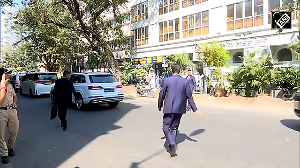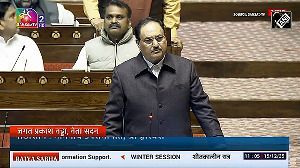Deadlock continued in crucial WTO negotiations between developed and developing countries as differences over contentious farm subsidies remained far from being resolved, with India mounting pressure on the European Union and the United States to deliver a fair deal.
"We discussed export competition in agriculture as non-agriculture market access," Commerce Minister Kamal Nath said after the crucial Green Room meeting, indicating that not much headway had been made.
However, he said the revised draft text is likely to be expected by Friday.
The crucial closed door discussions which ran late into night failed to break much ice amidst reports of West African nation Benin walking out of the meeting on the cotton issue with the US.
African nations including, Benin, Chad, Mali and Burkina Fasso say reform of rich countries' cotton subsidies, is vital to allow them to compete and rebuild their economies.
The United States cancelled a planned news briefing and said US Trade Representative Rob Portman would brief the media later in the day on the status of the global trade talks.
Portman asked the European Union to work with him on an overall farm reform deal that would give Washington the basis it needs to scrap massive US cotton subsidies.
"It would be irresponsible to the cotton farmers to tell them that subsidies are going to solve their problem. If you really want to help, come up with proposals that really do improve market access."
Green room meetings which are closed door are held among select group of countries, basically a broad representation of the WTO membership, in the presence of Director General and sector specific facilitators.
While Tuesday's meetings focused on the LDC package, the meeting on the second day which ended in the wee hours focussed on agriculture as it is the main sticking point in the global trade negotiations preventing any progress.
The EU, the US and developing countries, including India yesterday failed to inch forward on farm export subsidies even as the G-4 comprising the US, the EU, India and Brazil met ahead of the Green Room to push the negotiations.
"Talks have not moved forward as there has been no movement in agriculture which is the make or break issue in WTO talks. While the US has indicated that it is ready to eliminate all export subsidies by 2010, it is to be seen what is their criterion of farm export support," Nath said.
Elaborating, Nath said developing countries want all kinds of export subsidies, including exports credits, food aid and State Trading enterprise listed under the July Framework to go by 2010, adding that EU is yet to set a date.
While the G-20 proposes that the highest agricultural tariffs be cut by 75 per cent, an ambitious proposal by the US demands 90 per cent. The EU has proposed a 60 per cent cut in the highest tariffs and cap of 100 per cent.
On subsidies US has proposed a cut of 75 per cent for EU while 55 per cent for itself, while the EU is for 70 per cent reduction and tightening of Blue Box (farm subsidies which are considered not so trade distorting). G-20 on the other hand wants developed countries to cut 70-80 per cent of their trade distorting support.
Nath said there had been no movement on the quota-free and duty free market access LDC package as the US was still not ready for it. The EU, which has strongly objected to America's food aid programme, is pushing hard for this package as also cotton subsidies in the US, preventing movement in the crucial area of agriculture.
He said if blame for the deadlock came on developing countries, including India, the country would accept it. "We are not looking to shirk any blame. Trade should not just be free but also fair. Conceding that the negotiations here could not achieve everything, US proposed setting up another deadline to break the deadlock to complete the round by 2006 while making it clear that the "only way to break the deadlock required convergence on market access in agriculture."
Putting the onus on the EU for any movement, US Trade Representative Rob Portman said, "I join other countries in the developed and developing world in calling our trading partners in Europe to agree to a global formula that truly meets the Doha requirement of substantial improvement in market access."
The EU said it was important to seek a balanced outcome from the round and for any progress in agriculture equal movement has to be made in industrial goods and services.
"Europe continues to seek a balanced outcome to this
round. Agriculture is important. Trade distorting subsidies must be cut back. But single issue round cannot succeed. That's why success of the round will depend on our ambition to liberalise trade in industrial goods and services and to strengthen trade rules," EU Trade Commissioner Peter Mandelson said while making it clear that development package was aimed at poorer countries.
Though both developed and developing countries are keen to work out a package for LDCs for duty free and quota free market access, there are differences on it with the US saying there are still issues on the legal framework and implementation date of the deal.
India which has formed a new group on NAMA kept its offensive both in agriculture and industrial goods to ensure that the principle of less than full reciprocity gets incorporated in the tariff reduction formula even as Mandelson and US deputy T R Peter Allgeier made it clear that it was a part of the whole deal and could not be dealt with in a stand alone manner.





